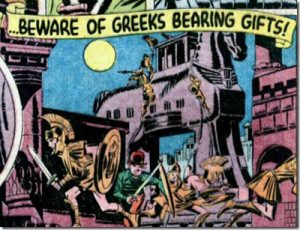Timeo danaos et dona ferentis?
 by Martin Davie:
by Martin Davie:
There are two stories which helpfully illustrate the choice which those on General Synod who hold an orthodox view of human sexuality will have to make about whether to vote to ‘take note’ of GS 2055, the House of Bishops report on Marriage and Sexual Relationships after the Shared Conversations.
The first of these stories is told by Virgil in the second book of the Aeneid. It tells of Laocoon, a priest of Troy. He is wise to the subterfuges employed by the Greeks during the long years of the siege of the city and warns his fellow countrymen against accepting the giant horse the Greeks have left as a gift to be offered to the gods. He utters the famous words ‘timeo danaos et dona ferentis’ (‘I fear the Greeks even when they bring gifts’). However, the Trojans ignore his warning and bring the horse (which is actually full of Greek soldiers) into their city with Troy being destroyed as a result.
The second is the story told by C S Lewis in The Last Battle, the final book in his Chronicles of Narnia. In this story Lewis tells of a group of dwarves who have been repeatedly lied to by people claiming to represent Aslan, the Christ figure in the Narnia stories. As a result they have become so suspicious in their thinking that they are convinced that they are sitting a dark stable with nothing but stable litter to eat when in fact they are sitting in the light in beautiful countryside with a delicious feast to eat. Furthermore, they hold that anyone who tries to convince them otherwise (including Aslan) is once again trying to deceive them.
What these two stories show us is that in thinking about what choices to make in the present we are inevitably influenced by the experiences of our past. Sometimes these experiences can lead us to perceive truth (as in the case of Laocoon) and sometimes they can lead us to reject the truth (as in the case of the dwarves).





